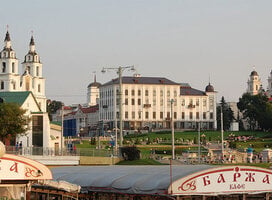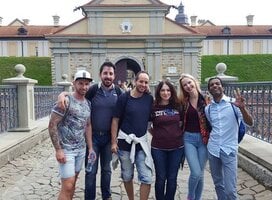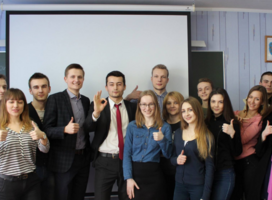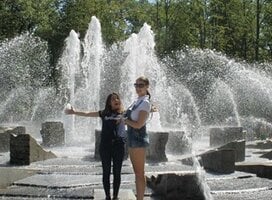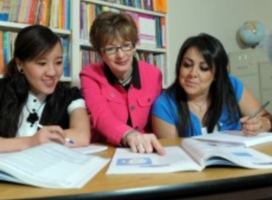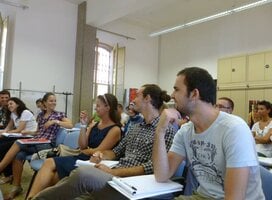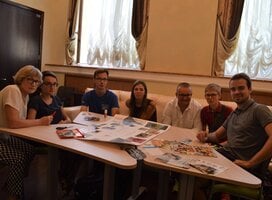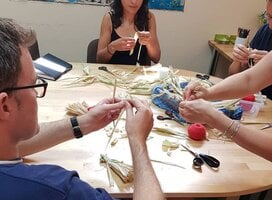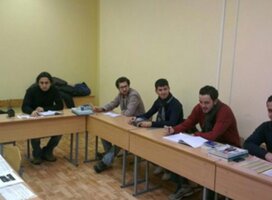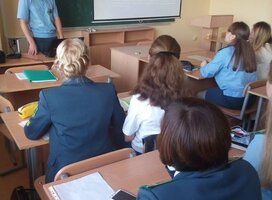Russian Language Schools in Belarus
With a total population equal to that of New York City, Belarus is a small country with big offerings! It’s brought us the talented painter Marc Chagall, the Nobel Prize literature winner Svetlana Alexievich, and the programmers who created the Viber app.
Even with Belarus' numerous contributions, tourism numbers are low, with only 100,000 people visiting the country each year. This provides ample opportunity for language learners to experience a country largely untouched by outside visitors.
In 1995, Russian became an official language of Belarus, due to the country's long, intertwining history with Russia. Since Belarus was part of the Soviet Union at one point, many people still speak Russian at home, making Belarus an optimal and authentic destination for Russian language learners.
Course Types
There are pros and cons to each type of language learning offered overseas, so it’s important to understand which option is best for you. This can vary based on how long you want to spend overseas or restraints you may have related to school, work, or finances. Whatever your interests or educational preferences, if there’s a will to learn Russian, there's a program to match!
- University courses. University courses are great for students in college who want to increase their foreign language skills. Not only do students receive credit to put towards graduation, but they are able to study other courses in their target language, as well. Usually, the student’s home university can provide options for which university to attend depending on the student's interests. They are also usually able to provide lodging, help with cultural assimilation, and connect you with other university students abroad. If you're not studying in a university, some foreign universities allow enrollment in courses without formally pursuing a degree. In this case, universities require a language test and documents such as high school diploma for acceptance into their programs.
- Homestay Programs. Those who are eager to converse with babyshkas or eat authentic potato draniki should consider living with a Belarusian family that speaks Russian in their household. Host families love to share their culture and help improve a student’s Russian language skills. Although living with native speakers can be intimidating, those who opt for a homestay make enormous strides in their conversational Russian compared to those who live on their own or with those who speak their native language.
- Language Study & Volunteer Programs. A great way to learn Russian while helping those in need is through volunteer programs. In addition to volunteering, organizations provide language learning courses to volunteers in order to help them better serve the local community. For example, the Peace Corps provides intensive language classes as part of their volunteer training, but their commitment to volunteering is between 12 to 24 months.
- Cultural Immersion. Courses that focus on cultural immersion are more about teaching the language through activities or field trips. They are less focused on traditional classroom teachings and more focused on offering hands-on experiences. For example, it can be a class that focuses on learning Russian through cooking traditional foods. If you’re ready to ditch the monotony of a classroom, this may be a good option to explore.
Why Learn Russian Abroad
Belarus has a long history with Russia and the Russian language that is spoken in the country is very clean and proper. You can be assured that the language you’ll be learning is the same pronunciation, accent, and vocabulary that they use in Russia.
Russian is a very difficult language to learn and is ranked third most difficult in the world to learn after Arabic and Mandarin. To gain a true command of the language, it’s important to completely immerse yourself in the daily aspects of life, from grocery shopping to dinners with local friends.
By being able to hear, see, and speak Russian in everyday interactions, it will solidify what you're studying in a practical way. You'll also become aware of common expressions, jokes, and social commentary that's not taught in a classroom.
Qualifications
Language schools, homestays, and cultural immersion programs have few requirements before starting a course. These programs are geared for all levels, starting from beginner courses all the way to advanced.
University courses usually require two to three years of Russian classes before acceptance into a study abroad program. These programs usually not only teach the Russian language but the rest of the semester classes in the local language as well.
Popular Locations to Learn Russian in Belarus
Although Belarus is sometimes called "Europe's last dictatorship," Minsk is a safe and easy-to-navigate city. As the capital, Minsk is an ever-changing landscape of old and new -- stunning thousand-year-old Orthodox churches stand next to imposing Stalinist architecture. The rest of the city is sprinkled with progressive art galleries, modern libraries, and trendy cafes.
As one of the oldest towns dating back to 1142, Gomel has history hiding in every nook and cranny. From palaces to cathedrals to military memorials, it's a city that will intrigue and inspire at every turn. Not only known for cultural gems such as Gomel Palace and Cathedral of St. Paul, but Gomel is also a center for education with an extensive network of technical and higher education schools.
Choosing a Russian Learning Program in Belarus
Understanding the type of learning experience needed for personal language growth and achievement is first and foremost. For example, a university program is a drastically different learning environment than private tutoring. What is most important for you as a student? Community? Cultural experiences? College credit?
Going overseas can be overwhelming with organizing not only courses, but also lodging, phones, visas, and understanding the cultural landscape. It’s important to find a program that can provide resources or aid when questions arise. Financial affordability can be a deterrent for some as well, so do consider the course's tuition fees and whether there are scholarships or financial aid available for your particular program.
Another thing to consider is if the program you choose will provide social opportunities to foster community or cultural experiences to deepen your understanding of the country and language.
Cultural Immersion in Belarus
There are many ways to culturally immerse oneself in Belarus with the multitude of museums, theaters, and art galleries. Whether attending the National Academic Bolshoi Opera and Ballet Theatre in Minsk or the International Arts Festival in Vitebsk, each outing will provide insight into the rich heritage and cultural offerings of Belarus.
The best way to understand Belarusian life and the deeper workings of social interactions is to go to local spots and talk with local people. Not only will students be able to practice their Russian skills, but also understand the cultural intricacies on a deeper level.
Average Russian Language Learning Tuition in Belarus
Group classes either in a language school will be cheaper than independent tutoring. For group classes, students can aim to spend between $250 and $400 for 20 classes or hours per week. Private, one-on-one classes can range between $30 and $50 per hour.
University courses taken as study abroad will be comparable to the tuition of the university students are currently attending. More can be found on your university campus by talking to department and administration staff.
Courses of "Russian as a foreign language" at Belarusian universities are calculated by how many people are in the class plus hours per week and weeks taken. For example, 20 hours of Russian language for four weeks in a group setting can cost around $300.
Volunteer programs vary depending on what is included in your volunteering time. Some local and independent organizations have programs that require a fee. The Peace Corps does not require a fee and instead provides a monthly stipend.
Scholarships for Learning Russian in Belarus
A great scholarship awarded for learning Russian as an American study abroad student is the Benjamin A. Gilman International Scholarship. To be eligible, students must be receiving the Federal Pell Grant and devote at least four weeks in one country to receive $5,000.
Since Russian is considered a less traditional language to learn, but a necessary one for national security, Russian language students are eligible for the Boren Awards. Undergraduate and graduate students who are interested in learning Russian as a foreign language and want to work for the U.S. government may apply for Boren Awards and receive a scholarship between $20,000 to $30,000 to fund their education.
The Eastern European Study Abroad scholarship is for those who want to study abroad in Eastern Europe. To be eligible, the applicant has to be currently enrolled in a university with a minimum GPA between 2.50 and 3.25.
In general, there are many more scholarships available for Russian language learners.
Cost of Living in Belarus
Living in a city or outside a city can make a considerable financial difference. A one bedroom apartment in the center of a city can be anywhere between $300 and $600 per month while an apartment outside the city is between $250 and $400 per month. On top of housing costs, consider utilities such as water, garbage, and electricity, which can range between $30 to $60 per month.
Although a dinner out on the town can cost between $7 and $15 per person, groceries are much less expensive, with a standard loaf of bread costing less than a dollar.
Getting around the city can be quite cheap if using public transportation, costing about $15 for the whole month. In comparison, taxis start around $2 and each mile is an additional 50 cents.
Visas & Other Relevant Information
For U.S. citizens, visas are necessary for anyone staying in the country for five days or more. Short-term visas (up to 90 days) and long-term (one year) visas are available. Both visas cost 60 euros to obtain. A passport, letter of invitation, passport photo, and other consular documents are usually needed to file an application.
